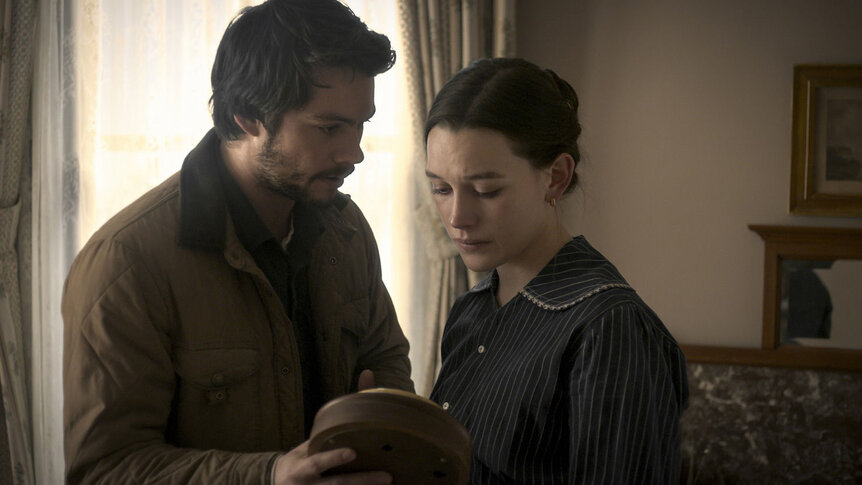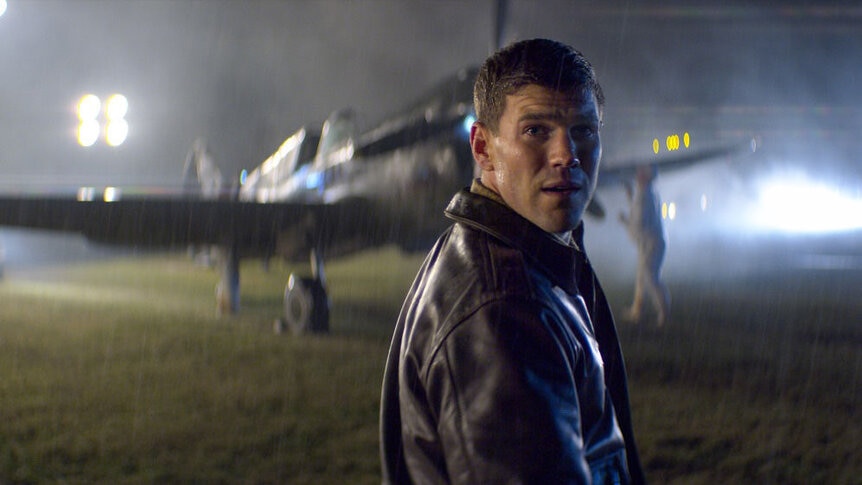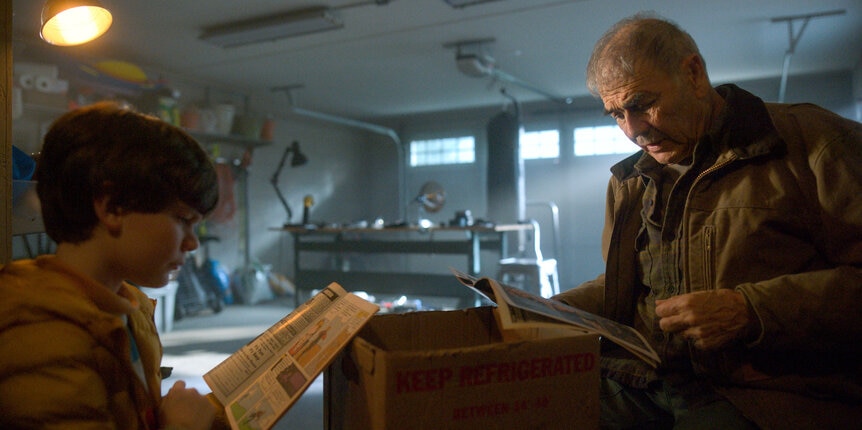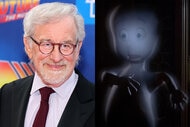Create a free profile to get unlimited access to exclusive videos, sweepstakes, and more!
Amazing Stories showrunners compare Spielberg to 'Mozart at work' & consider Season 2
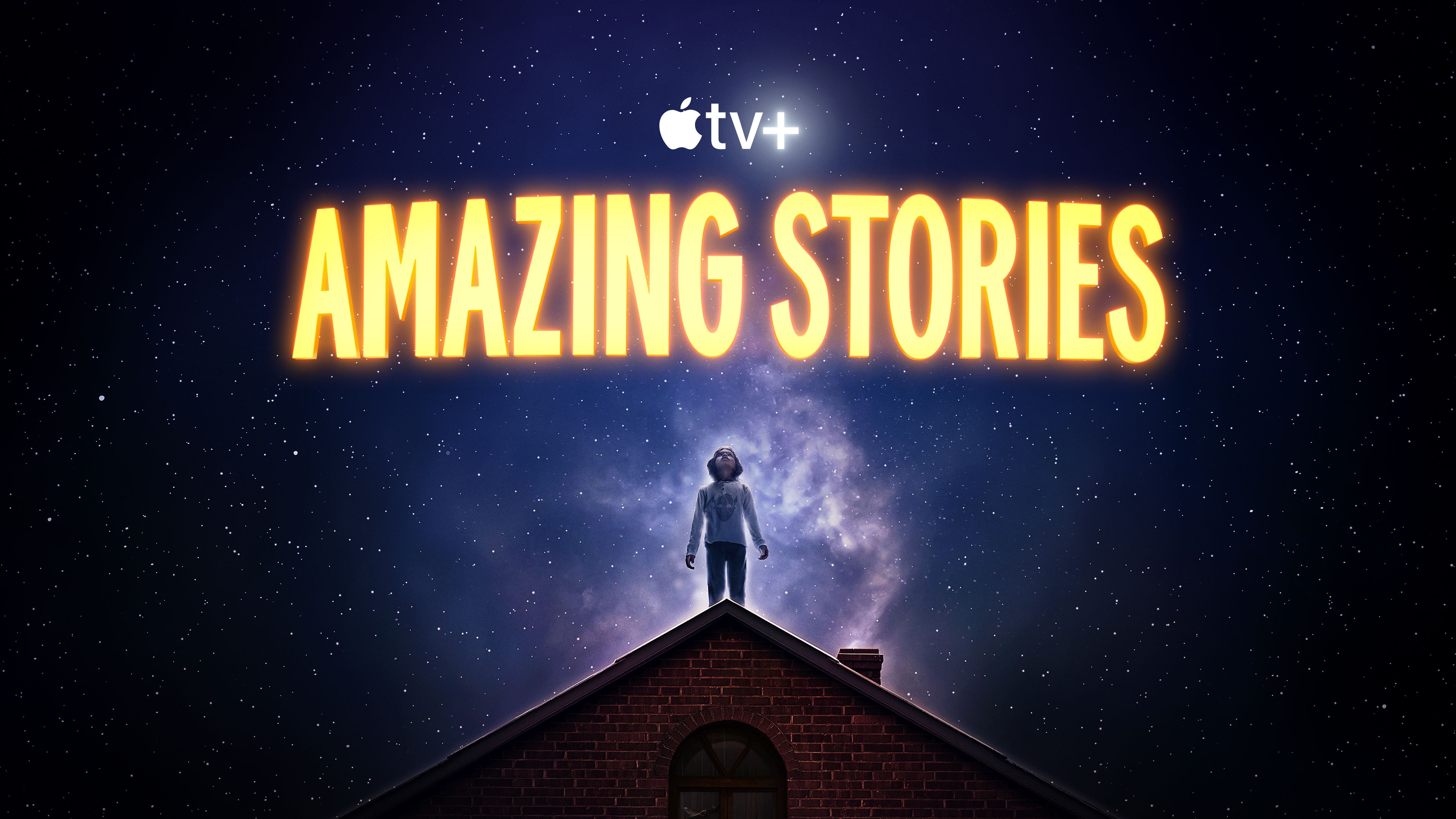
Way back in 1985, Steven Spielberg attempted to resuscitate the anthology format on television as the executive producer behind the NBC series Amazing Stories. The show only lasted two seasons, but it boasted incredible directors, including Joe Dante (Gremlins), Clint Eastwood (Unforgiven), and Robert Zemeckis (Back to the Future), and it was an incubator for future big-name talent, including Brad Bird (The Incredibles), Lesli Linka Glatter (Mad Men), and Ken Kwapis (The Office).
In 2017, Spielberg announced that Amazing Stories was being redeveloped for a new generation. After some direction changes, Spielberg chose Edward Kitsis and Adam Horowitz (Lost, Once Upon a Time) as executive producers and showrunners for the Apple TV+ revival of the series. The new iteration featured an inaugural season of five original episodes that are all now available to stream via Apple TV+.
Working with Kitsis and Horowitz to craft these tales are writers who have worked in the writers' rooms for pedigreed series: Once Upon a Time, American Horror Story, The Americans, and Knightfall, to name a few. SYFY WIRE got on the phone with Kitsis and Horowitz to dig into the making of the full season , find out Spielberg’s input on Season 1, and ask about their favorite memories making new Amazing Stories episodes.
After working so long on serialized shows, was the anthology format an attractive undertaking?
Adam Horowitz: The real reason we did the show was Steven Spielberg. We grew up on Steven’s [work]. The opportunity to work with Steven was an opportunity that we couldn’t turn down, and it was a lifelong dream.
And it really became about, for us, how do we honor what he does, work with him, and try our best to reach that bar that he set, which is as high as it comes, and tell his kind of stories for today? What are “amazing stories” in today’s world with all sorts of characters and people that span the world today? That was our guiding light at first, as opposed to thinking about other anthologies or anything. It was really about the Spielberg way of storytelling.
Had you ever taken a general meeting with Steven before, or was this your first meeting?
Eddy Kitsis: We had never met Steven before. The closest we came is we saw him at an awards show from across the room once. He was obviously our hero and the main inspiration for us to come out here and be writers to begin with.
What happened was Once Upon a Time was just ending, and Adam and I were gonna take some time off. And then the first call that came in was Amblin Television asking if we’d consider this. And we said yes. And so, they were like, “Great, let's put you on the phone with Steven.” My heart started to beat [so fast]! Then we got the call from Steven. And after talking to him, we literally had to pace the Disney lot [where their offices are]. We couldn’t believe it. And his two executives, Justin [Falvey] and Darryl [Frank], called us and said, “Great conversation, guys! Now, tomorrow we'll put you on with the real Steven. That was his impersonator.” We were so nervous that we believed them. [Laughs]
What was it like working with him?
Horowitz: It was a lifelong dream just to meet him. But to work with him was beyond anything we could've ever imagined. And to collaborate with him exceeded all of our expectations because he did a number of things that were really amazing, pardon the pun.
He really has a way of bringing out the best in people and pushing us to take these stories to places that are hopefully unexpected and surprising and human and emotional. I think that's what he really does with his storytelling, and he's done it throughout his career, which is to find the humanity in everything. And that was also a guiding principle for the show, which was always about the ordinary meeting the extraordinary.
With each one of these stories, we tried to start from a place of “Who are these characters?” Who are these people in a very grounded, real, and hopefully relatable way before the “amazing” would enter their lives?
How did you narrow down your story ideas and distill them into the five episodes?
Kitsis: We assembled a group that we called the “Amblin think tank,” so we actually had a writer’s room on Amazing Stories. And then Steven also had ideas. What we would do is either take ideas from the room or ideas Steven gave us. We would work on them, and then we would go back to Steven. Adam and I would pitch it to him and get his thoughts along the way. And then the obvious favorites emerged.
Horowitz: And out of those sessions would grow the ideas that then we would bring back into the writer’s room and break and develop into the stories and outlines and scripts that became the episodes that you will see.
Of the five, were any particularly Steven’s favorite?
Kitsis: All of them, really. You have to understand, Amazing Stories is his baby. He created it. He loves it. So, he loved every episode. He gave notes on every cut, every script, every outline, every casting choice.
What was your moment working with him that really relayed his genius to you?
Horowitz: Pretty much every moment with him there was some expression of, “Wow, this is why Steven Spielberg is who he is,” where he would reveal that specialness that makes him unique and makes him this master of all these mediums.
I remember one in particular just looking at one of the cuts in the editing room. There was a little car chase thing that we’d put together. And it was just watching him and hearing these notes, like, “Oh, you drop this shot here and you pull the music there and you cut here and you pull it there and cut this shot shorter, then hold this one longer.” It was so second nature to him. It was like watching Mozart at work. And it was like, “Oh, yeah, this is a million times better already.” I mean, it was unbelievable to watch. And you just try to absorb it all and just take anything you could learn from it.
“The Rift” was based on a comic. So was that a story option you made that ended up working for the Amazing Stories format?
Kitsis: Yes, before we even came in, they said, “We have this comic book The Rift that would make a great episode." And then Chinaka Hodge, who wrote The Heat, that was actually a feature script we developed with Sundance. Adam and I read it, and we bought it for the show and re-developed it.
Horowitz: We were always looking for unique and strong voices, and then working with these [specific] writers to see how they could fit into the Spielberg world. And how we could make them feel like they fit into the Amazing Stories world. That was the challenge with it all, and it was very exciting to get to work with the varied writers we did and work with Steven and to try to create this kind of new generation of Amazing Stories.
Now that the entire season is available, do you recommend watching them in the run order, or is there one that is a better entry episode?
Kitsis: Oh, well, it's like any album now, if you want to just put it on shuffle, but this is the original order. But, for me, find the one that excites you the most 'cause hopefully that will lead you to watch the next one. It depends who you're watching with, so we don't care what gets you hooked, as long as you get hooked.
One of actor Robert Forster’s last roles is in the episode "Dynoman and the Volt!" What are your memories of working with him?
Horowitz: We were so lucky to work with Robert Forster.
Kitsis: Yeah, we were huge fans of his. When he said yes, we were jumping up and down. One of my favorite memories was we were watching dailies, and it was his first day of dailies. It was the scene at the end where he sees that his grandson is in trouble. And he did the greatest, “Holy sh**!” you’ve ever seen, which unfortunately had to be cut for the rating. But, in that moment, you just knew the whole episode was gonna work because he took that character and elevated it in such a way that it was so amazing. The writers would watch his dailies every day during lunch in awe. And like spectators, like fans, we would just watch him.
And Susann Fogel, who directed that episode, did such a great job. One of the things I loved so much about that episode was Robert and Susanna got such a sense of fun. When you watch the episode, every department had a joy making it and you see that in every frame. You see it in the costumes. You see it in the way the actors interact with each other. Everything was just a little more magical on that. It was great.
Are there a lot of stories you developed that are ready to go for a potential Season 2?
Kitsis: If there's a Season 2, I definitely think there's some ideas that we kicked around or didn't get to or things that people have thought of. But, we just locked last October, so we haven't really got into anything about "What would a Season 2 be?"
Horowitz: I think the album metaphor that we were talking about before [applies here], which was how do these stories interlock in a way that spanned different kinds of stories and fit together and tell a different range of tales and characters. That's what we did with Season 1.
And should we get a Season 2, we're excited to dig back into a lot of ideas that were percolating and I'm sure many new ideas that would come up that could create maybe a second album, so to speak.
